Outside sales representatives are the face of your company in the field. They build relationships with clients, understand their needs, and offer solutions that meet those needs, driving sales and fostering customer loyalty.
Skills for outside sales representatives include strong communication, negotiation, and time management abilities, as well as the capacity to understand and present product knowledge effectively.
Candidates can write these abilities in their resumes, but you can’t verify them without on-the-job Outside Sales Representative skill tests.
In this post, we will explore 9 essential Outside Sales Representative skills, 11 secondary skills and how to assess them so you can make informed hiring decisions.
Table of contents
9 fundamental Outside Sales Representative skills and traits
The best skills for Outside Sales Representatives include Product Knowledge, Customer Engagement, Negotiation Skills, Time Management, Communication Skills, Market Research, CRM Proficiency, Problem-Solving and Presentation Skills.
Let’s dive into the details by examining the 9 essential skills of a Outside Sales Representative.
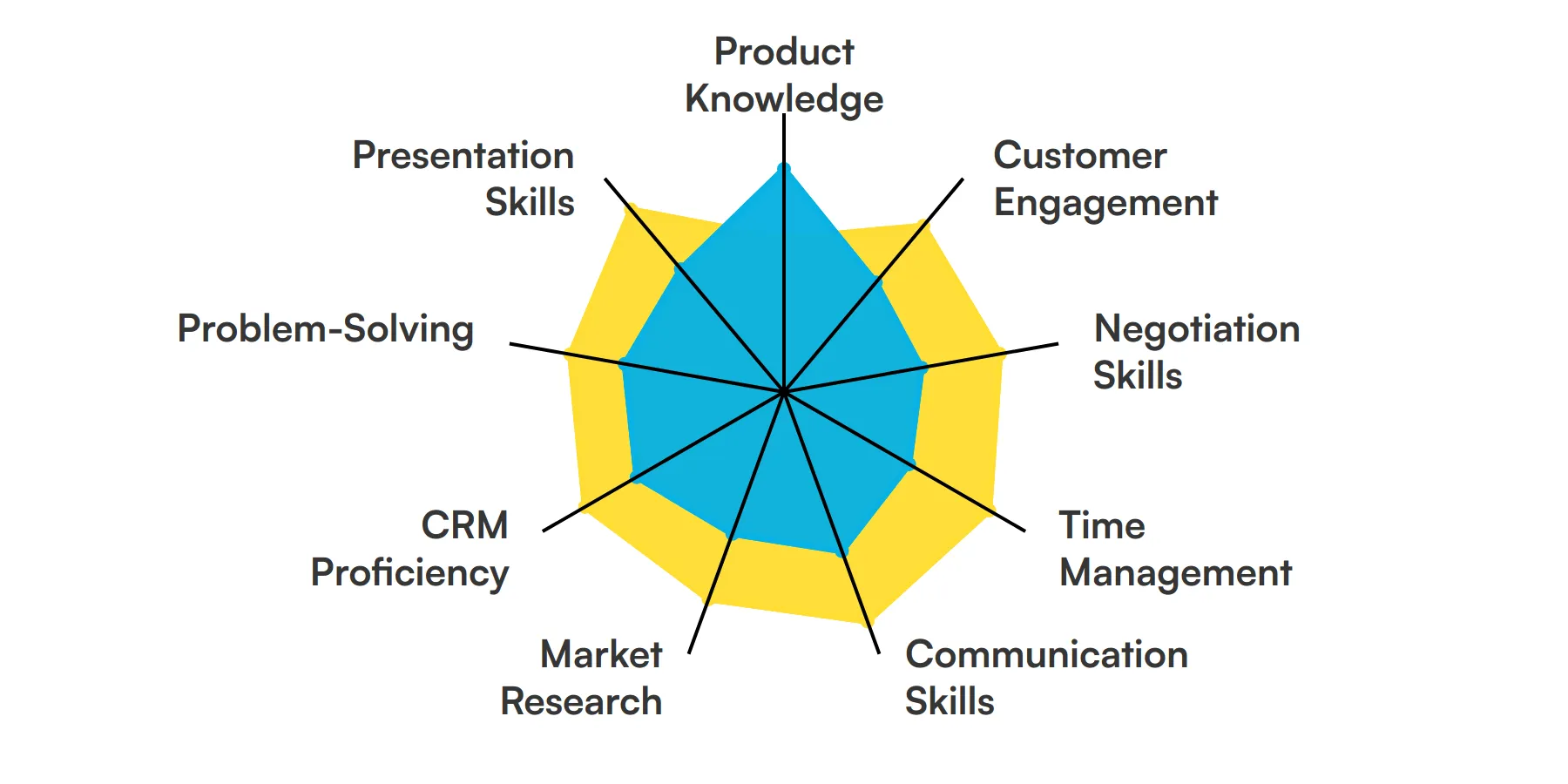
Product Knowledge
Understanding the product inside and out is crucial for an Outside Sales Representative. This knowledge allows them to answer customer questions confidently and tailor their pitch to meet the specific needs of each client.
Customer Engagement
Building strong relationships with clients is key. An Outside Sales Representative must be adept at engaging with customers, understanding their needs, and maintaining ongoing communication to foster trust and loyalty.
For more insights, check out our guide to writing a Customer Service Representative Job Description.
Negotiation Skills
Negotiation is a daily part of the job. The ability to negotiate terms, prices, and contracts effectively can make or break a deal. This skill helps in closing sales and ensuring mutually beneficial agreements.
Time Management
Managing time efficiently is essential for covering large territories and meeting multiple clients. An Outside Sales Representative must prioritize tasks and appointments to maximize productivity and sales opportunities.
Communication Skills
Clear and persuasive communication is vital. Whether it's through emails, phone calls, or face-to-face meetings, an Outside Sales Representative must convey information effectively to influence and inform clients.
Check out our guide for a comprehensive list of interview questions.
Market Research
Staying informed about market trends and competitor activities helps in strategizing sales approaches. This skill enables an Outside Sales Representative to identify opportunities and threats in the market.
CRM Proficiency
Proficiency in Customer Relationship Management (CRM) software is important for tracking interactions, managing leads, and analyzing sales data. This helps in maintaining organized records and improving sales strategies.
For more insights, check out our guide to writing a CRM Manager Job Description.
Problem-Solving
Encountering and resolving issues is part of the job. An Outside Sales Representative must be able to think on their feet and provide solutions to customer problems, ensuring satisfaction and loyalty.
Presentation Skills
Delivering compelling presentations is crucial for showcasing products and services. This skill helps in capturing the interest of potential clients and effectively communicating the value proposition.
11 secondary Outside Sales Representative skills and traits
The best skills for Outside Sales Representatives include Networking, Adaptability, Tech Savvy, Analytical Skills, Follow-Up, Self-Motivation, Detail-Oriented, Interpersonal Skills, Goal Setting, Resilience and Travel Management.
Let’s dive into the details by examining the 11 secondary skills of a Outside Sales Representative.
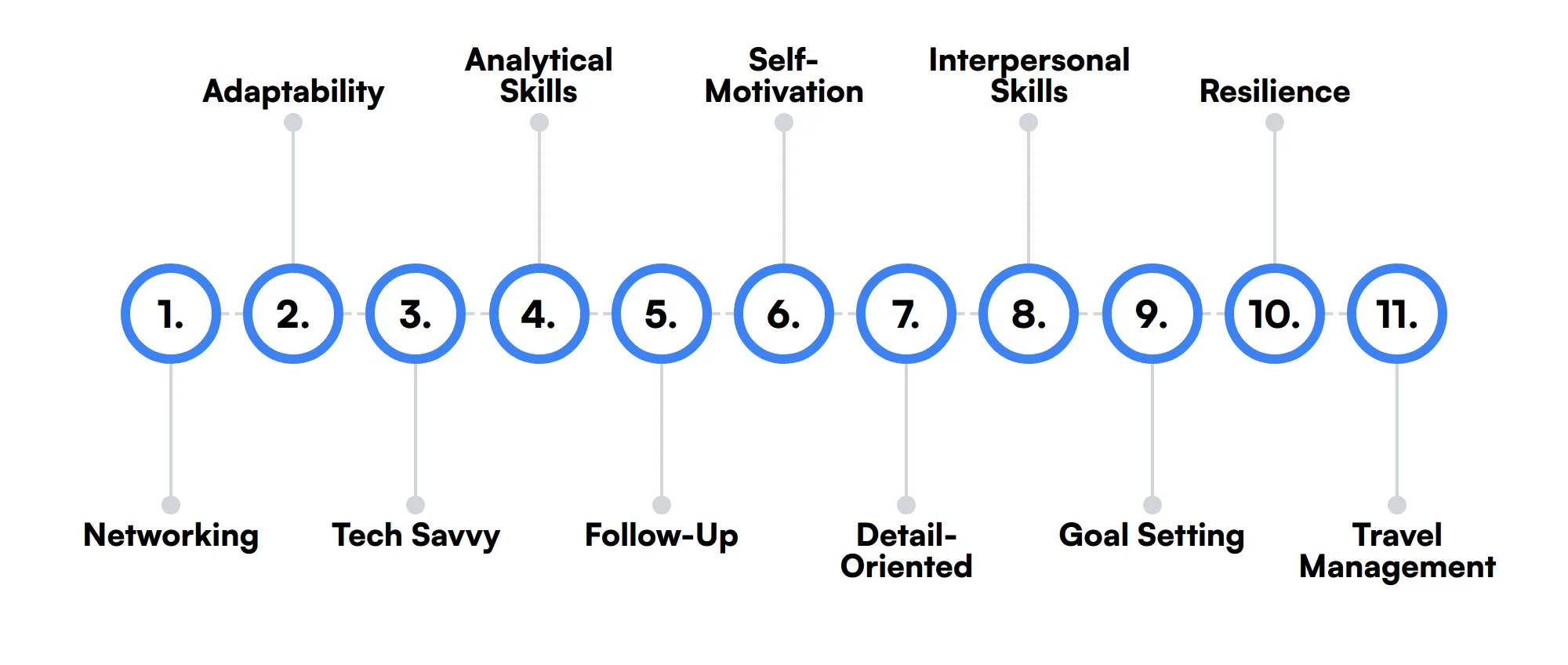
Networking
Building a network of contacts can open doors to new opportunities and referrals. This skill helps in expanding the reach and influence of an Outside Sales Representative.
Adaptability
The ability to adapt to changing circumstances and client needs is important. This skill ensures that an Outside Sales Representative can handle unexpected challenges and shifts in the market.
Tech Savvy
Familiarity with various sales tools and technologies can streamline processes and improve efficiency. This includes using mobile apps, sales software, and digital communication tools.
Analytical Skills
Analyzing sales data and customer feedback helps in refining sales strategies. This skill enables an Outside Sales Representative to make informed decisions and improve performance.
Follow-Up
Consistent follow-up with clients is key to maintaining relationships and closing deals. This skill ensures that potential sales are not lost due to lack of communication.
Self-Motivation
Working independently requires a high level of self-motivation. This skill helps an Outside Sales Representative stay driven and focused on achieving sales targets.
Detail-Oriented
Paying attention to details can prevent errors and ensure that all aspects of a sale are covered. This skill is important for managing contracts, orders, and client information accurately.
Interpersonal Skills
Building rapport with clients and colleagues is important for a collaborative work environment. This skill helps in creating positive interactions and fostering teamwork.
Goal Setting
Setting and achieving sales goals is a fundamental part of the role. This skill helps an Outside Sales Representative stay focused and measure their progress.
Resilience
Handling rejection and setbacks is part of the job. This skill helps an Outside Sales Representative stay persistent and maintain a positive attitude despite challenges.
Travel Management
Managing travel logistics efficiently is important for meeting clients in different locations. This skill ensures that an Outside Sales Representative can maximize their time on the road.
How to assess Outside Sales Representative skills and traits
Assessing the skills and traits of an Outside Sales Representative involves more than just glancing at a resume. It's about understanding how well they can handle real-world sales scenarios, from initiating customer contact to closing deals. To truly gauge their effectiveness, you need a method that evaluates their practical abilities in action.
Traditional interviews might give you a sense of someone's personality and experience, but they fall short in testing actual skills like negotiation, customer engagement, and problem-solving. This is where practical assessments come into play. By using tools like Adaface assessments, you can simulate real-life sales challenges and directly observe how candidates perform in situations they will face on the job. Adaface assessments are designed to help you identify top talent efficiently, boasting a 2x improvement in the quality of hires.
Incorporating these assessments into your hiring process not only saves time but also ensures that you are bringing on board individuals who are truly capable of elevating your sales efforts and achieving business goals. By evaluating key skills such as product knowledge, time management, and CRM proficiency, you can make informed hiring decisions that align with your company's needs and market demands.
Let’s look at how to assess Outside Sales Representative skills with these 6 talent assessments.
Sales Aptitude Test
Our Sales Aptitude Test evaluates a candidate's ability to engage with potential customers, manage relationships, and effectively handle sales challenges. It uses scenario-based questions to simulate real-world sales situations, testing skills in objection handling, negotiation, and closing deals.
The test assesses a candidate's proficiency in communication, sales fundamentals, and English, alongside their logical reasoning and problem-solving capabilities. It also evaluates critical thinking skills necessary for deriving logical conclusions from complex data.
Candidates who perform well on this test demonstrate strong capabilities in reaching sales targets and maintaining customer satisfaction. They show adeptness in handling objections and closing sales efficiently.
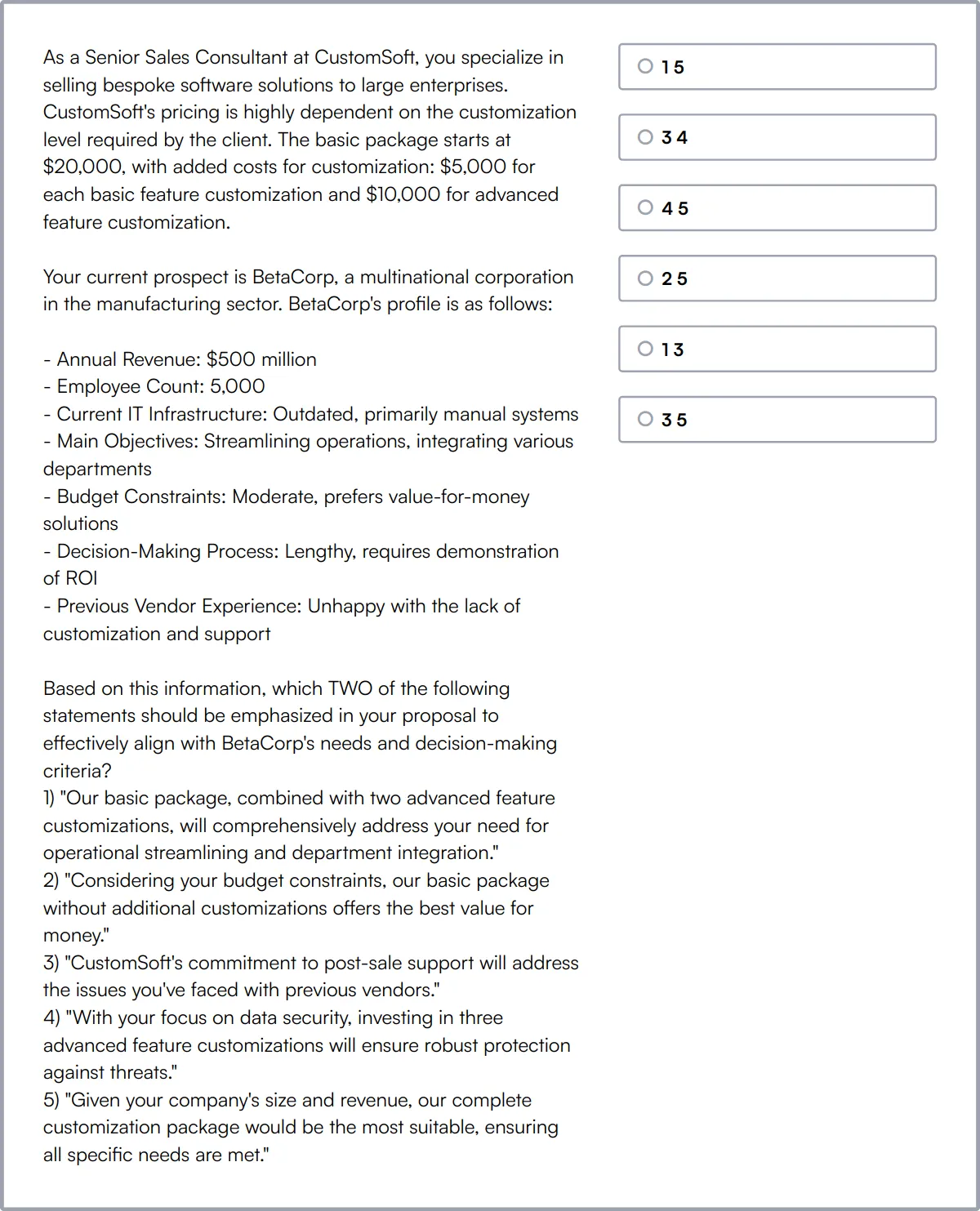
Customer Service Test
Our Customer Service Test measures a candidate's ability to handle customer inquiries and issues with empathy and efficiency. The test includes real-life scenarios to evaluate how candidates manage customer service challenges.
This test covers a range of skills including communication, problem-solving, empathy, conflict resolution, and product knowledge. It also assesses candidates' abilities in time management and attention to detail.
High-scoring candidates are likely to excel in customer-facing roles, demonstrating a strong customer-centric approach and the ability to resolve issues while maintaining positive engagement.
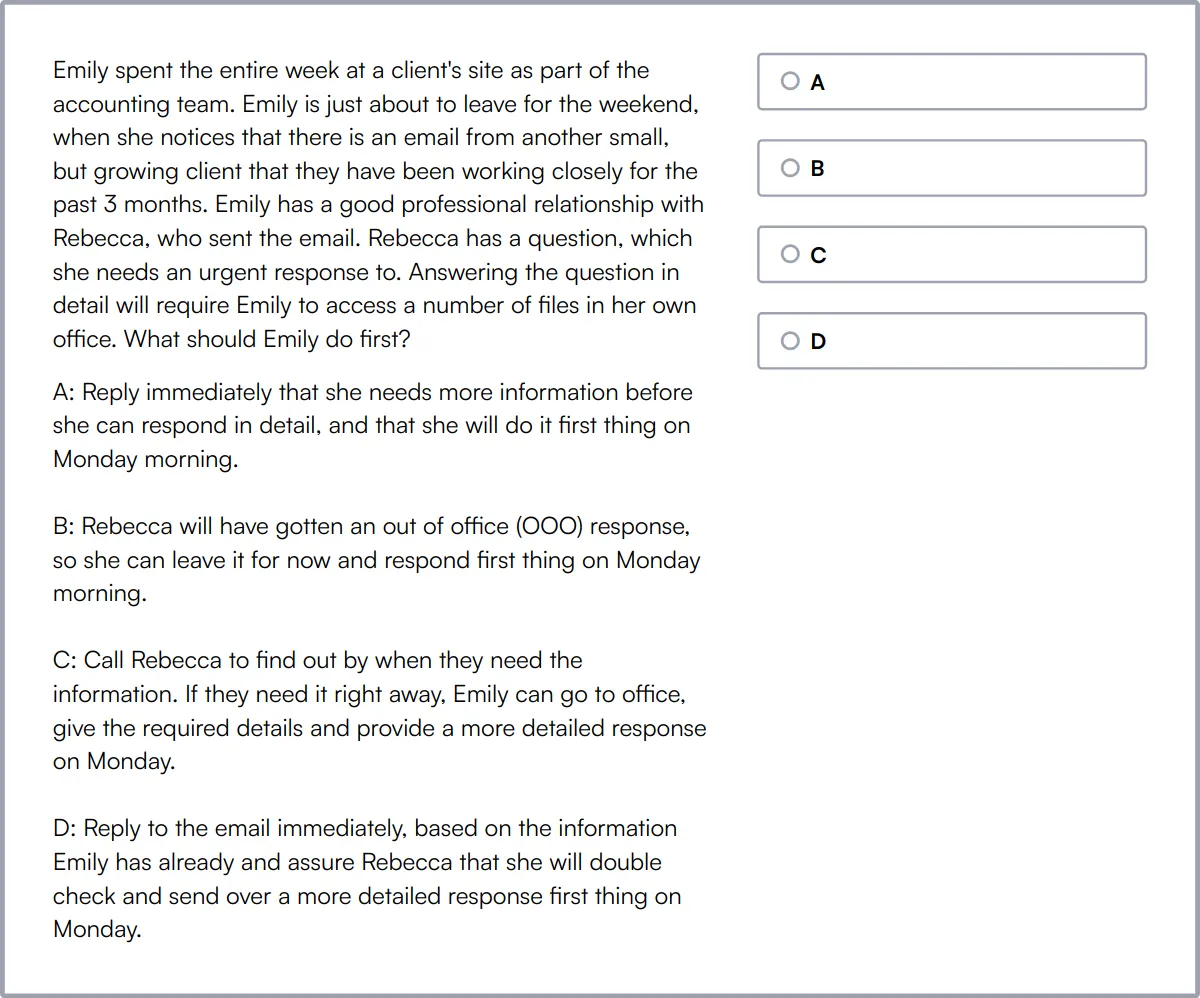
Situational Judgement Test
Our Situational Judgement Test assesses how candidates handle workplace challenges and interpersonal conflicts through scenario-based questions. It evaluates emotional intelligence, teamwork, and communication skills.
The test examines a candidate's decision-making, adaptability, ethics, integrity, and customer service skills. It provides insights into their ability to manage time and work under pressure.
Candidates who score well are typically effective in navigating complex workplace situations and maintaining professional relationships.
Communication Skills Test
Our Communication Skills Test evaluates how well candidates convey and interpret messages in a professional setting. It tests both verbal and written communication skills, including active listening and interpersonal interactions.
The test challenges candidates with situational judgement questions and critical thinking problems, assessing their verbal reasoning and attention to detail.
Effective communicators identified by this test are adept at maintaining clear and effective interactions with colleagues and stakeholders, ensuring smooth operational flow.
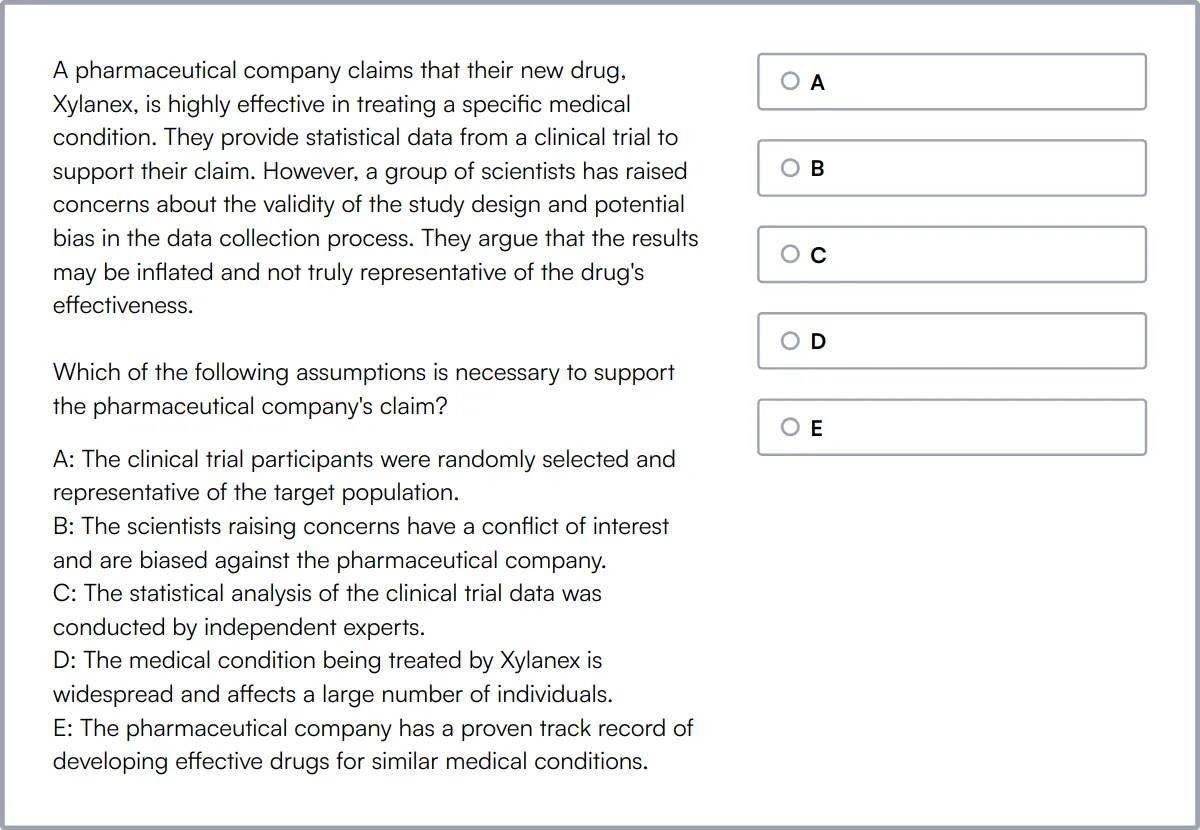
Market Research Test
Our Market Research Test assesses a candidate's proficiency in gathering and analyzing market data. It evaluates their skills in market research techniques, data analysis, and interpretation.
Candidates are tested on their ability to conduct thorough market analysis and utilize quantitative aptitude to derive insights from data. The test includes questions on business intelligence and marketing aptitude.
Successful candidates demonstrate a strong ability to support business decisions with accurate market insights and data-driven strategies.

Problem Solving Test
Our Problem Solving Test evaluates a candidate's ability to analyze complex problems and devise effective solutions. It includes questions on abstract, deductive, and inductive reasoning.
The test assesses critical thinking and pattern matching skills, along with spatial and abstract reasoning abilities. It provides insights into a candidate's learning agility and adaptability.
Candidates excelling in this test are typically strong in handling challenging situations and can adapt to new problems and environments quickly.
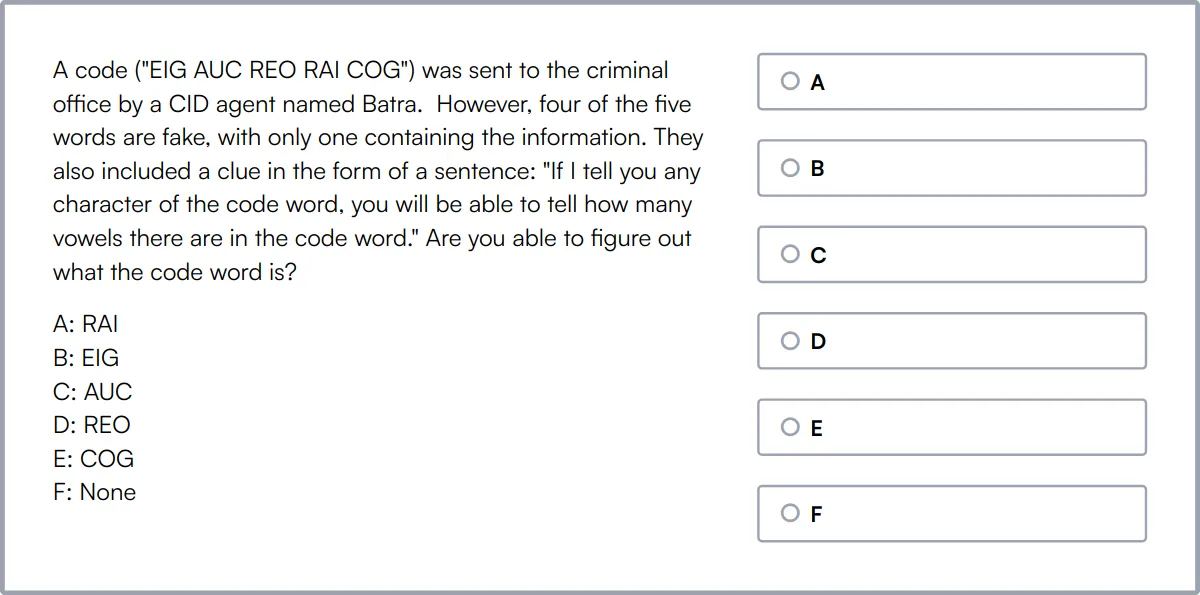
Summary: The 9 key Outside Sales Representative skills and how to test for them
| Outside Sales Representative skill | How to assess them |
|---|---|
| 1. Product Knowledge | Test understanding of product features and benefits. |
| 2. Customer Engagement | Evaluate ability to build and maintain customer relationships. |
| 3. Negotiation Skills | Assess capability to reach mutually beneficial agreements. |
| 4. Time Management | Check how well tasks and schedules are prioritized. |
| 5. Communication Skills | Gauge clarity and effectiveness in conveying information. |
| 6. Market Research | Determine proficiency in analyzing market trends and data. |
| 7. CRM Proficiency | Evaluate familiarity with CRM tools and data management. |
| 8. Problem-Solving | Assess ability to identify and resolve issues. |
| 9. Presentation Skills | Check effectiveness in delivering engaging presentations. |
Sales Aptitude Test
Outside Sales Representative skills FAQs
What are the key skills needed for an Outside Sales Representative?
Outside Sales Representatives should have strong product knowledge, customer engagement abilities, negotiation skills, and time management. They also need to be proficient in communication, market research, CRM tools, and problem-solving, with excellent presentation and networking skills.
How can recruiters assess negotiation skills in outside sales candidates?
Recruiters can assess negotiation skills by conducting role-play scenarios that mimic real sales situations. Additionally, discussing past experiences where the candidate successfully negotiated deals can provide insights into their negotiation capabilities.
What role does CRM proficiency play in the success of an Outside Sales Representative?
CRM proficiency helps Outside Sales Representatives manage customer interactions effectively, track sales opportunities, and analyze customer data to optimize sales strategies. It's a key tool for maintaining relationships and improving sales outcomes.
Why is adaptability important for an Outside Sales Representative?
Adaptability allows Outside Sales Representatives to adjust their strategies based on varying market conditions, customer needs, and new technologies. This flexibility can lead to more effective sales approaches and improved customer satisfaction.
How can time management impact the performance of Outside Sales Representatives?
Effective time management enables Outside Sales Representatives to prioritize tasks, schedule meetings efficiently, and allocate time to nurturing client relationships, all of which are critical for achieving sales targets and maximizing productivity.
What techniques can be used to evaluate an applicant's problem-solving skills for an Outside Sales role?
Evaluating problem-solving skills can be done through behavioral interview questions that ask candidates to describe how they handled challenging sales scenarios. Additionally, problem-solving tests or simulations can provide practical insights into a candidate's abilities.
How important are interpersonal skills in outside sales, and how can they be assessed?
Interpersonal skills are key for building and maintaining strong customer relationships, crucial for successful sales. These can be assessed through interviews focusing on past client interactions and by observing the candidate's behavior during role-playing exercises.
What is the significance of follow-up in the role of an Outside Sales Representative?
Follow-up is essential in ensuring deals are closed and customer relationships are maintained. It involves regular communication and check-ins after meetings, which help in building trust and demonstrating value to potential and existing customers.
Assess and hire the best Outside Sales Representatives with Adaface
Assessing and finding the best Outside Sales Representative is quick and easy when you use talent assessments. You can check out our product tour, sign up for our free plan to see talent assessments in action or view the demo here:

40 min skill tests.
No trick questions.
Accurate shortlisting.
We make it easy for you to find the best candidates in your pipeline with a 40 min skills test.
Try for freeRelated posts
Free resources



